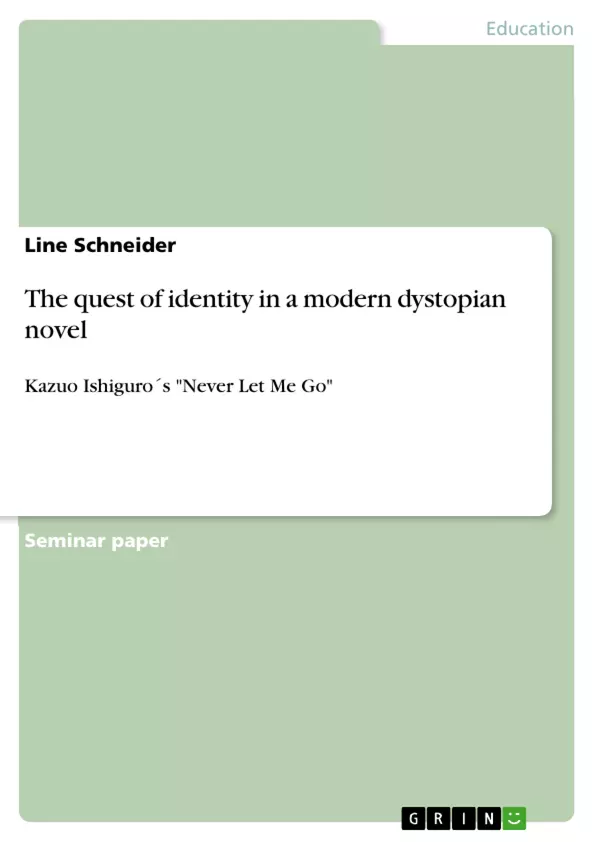The question of real identity is often raised by readers while reading books concerning dystopian worlds and societies. This term paper will discuss the quest of identity and elements of the utopian contemporary school society described in a novel from this decade, titled "Never Let Me Go" by Kazuo Ishiguro. In the novel the protagonists have a shorter life span than regular human beings. This, and the fact that their lives have been planned and predetermined to one day become organ donors leads to the struggle of identity and what identity truly means. Furthermore, the paper will focus on the use of ambiguous terminology used in the novel and how it manipulates the reader’s emotions and impressions. Specific words are being used, which the reader does not immediately link to the words meant by the narrator. To analyse the novel on the aspects of the identity quest, Henri Tajfel’s Social Identity Theory and his thesis will form the basis of the work: Social groups are essential and crucial for an individual’s identity.
The quest for identity always has been part of human nature. Just as imagining and fantasizing about perfect worlds and living in perfect conditions always has been. Humans enjoy visualizing a better place resulting from their dissatisfaction and disappointment in their societies. Not only utopias, also dystopias occupy the human mind. Both, ideal and non-ideal imagined worlds can help to analyse and improve one’s own and already existing world and society or also be identified as a warning against contemporary trends.
Inhaltsverzeichnis (Table of Contents)
- Introduction
- Use of ambiguous terminology
- Theoretical background: Identity Theories.
- Analysis of different aspects & actions of the novel
- Tajfel's Social Categorisation & Social Identity in Never Let Me Go
- Tajfel's social comparison in Never Let Me Go.
- Tajfel's Social creativity & individual mobility in Never Let Me Go.
- Conclusion
Zielsetzung und Themenschwerpunkte (Objectives and Key Themes)
This paper examines the quest for identity in Kazuo Ishiguro's novel "Never Let Me Go" and its depiction of a dystopian school society. The paper analyzes how the main characters struggle to define their identities within a predetermined life trajectory as organ donors, exploring the impact of ambiguous terminology used in the novel. The work will draw upon Henri Tajfel's Social Identity Theory to understand the role of group dynamics and intergroup relationships in shaping individual identity.
- The quest for identity in a dystopian setting
- The impact of ambiguous terminology on reader perception
- The role of Social Identity Theory in understanding group dynamics
- The influence of predetermined life trajectories on individual identity
- The exploration of identity in the context of organ donation
Zusammenfassung der Kapitel (Chapter Summaries)
The introduction explores the fundamental question of identity and how it is often raised in the context of dystopian fiction. The paper introduces the novel "Never Let Me Go" and its focus on the characters' struggle with identity in a world where their lives are predetermined as organ donors. The introduction also highlights the significance of ambiguous terminology used in the novel and its impact on the reader's emotions and perceptions.
The second chapter delves into the specific terminology employed by Ishiguro to describe various tasks and individuals within the novel's dystopian world. The author examines how certain words like "donor," "guardian," and "complete" carry hidden meanings that gradually unfold as the reader progresses through the story. The analysis focuses on how these terms are used to manipulate the reader's understanding and create a sense of unease.
The third chapter presents the theoretical framework for analyzing identity within the novel, focusing on Henri Tajfel's Social Identity Theory. The chapter outlines the theory's key concepts and its relevance to understanding group dynamics and the formation of individual identities. The theory provides a lens for analyzing the social groups and intergroup relationships that shape the characters' identities in "Never Let Me Go."
The fourth chapter delves into the analysis of the novel through the lens of Tajfel's theory. The chapter examines how concepts such as social categorization, social comparison, and social creativity manifest in the characters' interactions and experiences. The analysis explores how the novel's dystopian setting and the predetermined nature of the characters' lives influence their sense of identity and their relationships with each other.
Schlüsselwörter (Keywords)
The main keywords of this work are: dystopia, identity, Social Identity Theory, ambiguous terminology, organ donation, group dynamics, intergroup relationships, "Never Let Me Go," Kazuo Ishiguro.
- Quote paper
- Line Schneider (Author), 2018, The quest of identity in a modern dystopian novel, Munich, GRIN Verlag, https://www.grin.com/document/496051




